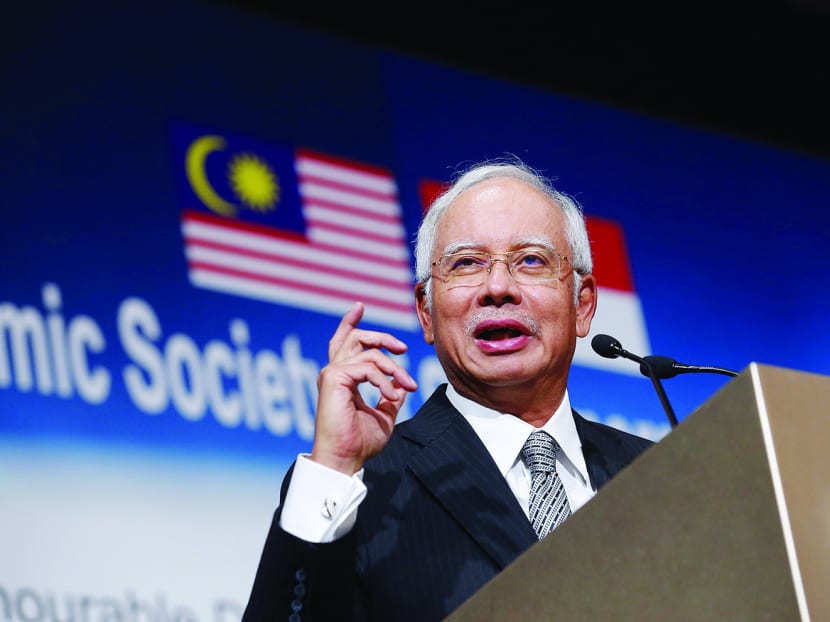Deep bilateral ties will bring more benefits, says Najib
SINGAPORE — Ties between Singapore and Malaysia run very deep and go back a long way, and these ties will continue to bring tangible economic benefits to the peoples of both countries, said Malaysian Prime Minister Najib Razak yesterday.
SINGAPORE — Ties between Singapore and Malaysia run very deep and go back a long way, and these ties will continue to bring tangible economic benefits to the peoples of both countries, said Malaysian Prime Minister Najib Razak yesterday.
Delivering the keynote speech at the Economic Society of Singapore Annual Dinner, Mr Najib added that Malaysia’s strong economic fundamentals and investment-friendly climate will continue to draw Singaporean investors.
“We are both each other’s second largest trading partner after China. And Singapore remains one of the top investors in Malaysia, with the total value of approved projects last year standing at RM8.3 billion (S$3.08 billion),” Mr Najib told more than 500 guests.
Declaring that bilateral ties have never been better, Mr Najib said he was delighted that Prime Minister Lee Hsien Loong, who also attended the dinner, had received a clean bill of health. “I have a friend who is fighting fit and together we will be able to shape the destinies of our peoples to make our relationship ever more productive, mutually beneficial and forward looking,” he said.
On bilateral economic ties, Mr Najib said that while the Iskandar Development Region in Johor and industrial free zones in Penang have been drawing the bulk of investments from Singapore, companies are now also beginning to invest in other economic corridors in Malaysia, including Sabah and Sarawak. “We welcome this, as it supports Malaysia’s move up the value chain and spurs innovation, both of which are crucial in sustaining our economic momentum.”
Bilateral trade between Malaysia and Singapore stood at RM209 billion last year. Foreign Direct Investment (FDI) stock from Singapore to Malaysia alone amounted to RM80.7 billion in 2013. Malaysia’s Khazanah Nasional and Singapore’s Temasek Holdings, the major government linked companies of both countries, have worked closely together on many high-value projects, including the proposed Wellness Centre in Iskandar Malaysia.
Mr Najib added that the fundamentals of Malaysia’s economy are strong, with healthy economic growth projected. “The global economy currently faces many challenges, including the decline in oil prices and other major export commodities. Despite this, I am pleased to say that Malaysia is doing well. Last year, we posted a GDP growth rate of 6 per cent. I am confident that this year we can achieve economic growth of between 4.5 to 5.5 per cent, in fact closer to the latter figure,” he said.
Touching on the introduction of the 6 per cent Goods and Services Tax in Malaysia on April 1, Mr Najib said that the biggest reform ever of the country’s tax regime “will broaden our tax base, strengthen our revenue stream and further reduce dependency on oil and gas, but we also anticipate that this will lead GDP to increase by 0.3 per cent and exports by 0.5 per cent”.
Under Malaysia’s budget for 2015, new tax incentives have been introduced for principal hubs and projects that invest in innovation, technology and create high-income jobs — areas that are of particular interest to Singaporean companies.
On broader economic integration in the region, Mr Najib reiterated Malaysia’s commitment to push for the ASEAN Economic Community (AEC). Malaysia holds the rotating chair of the Association of Southeast Asian Nations (ASEAN) this year, and the grouping has set itself an ambitious target of being an integrated economic region by Dec 31.
Referring to the scepticism on whether the AEC would be ready on time, Mr Najib said: “ASEAN leaders remain absolutely committed to this. The current implementation rate of AEC initiatives is over 90 per cent, and we will press for that figure to rise.”







